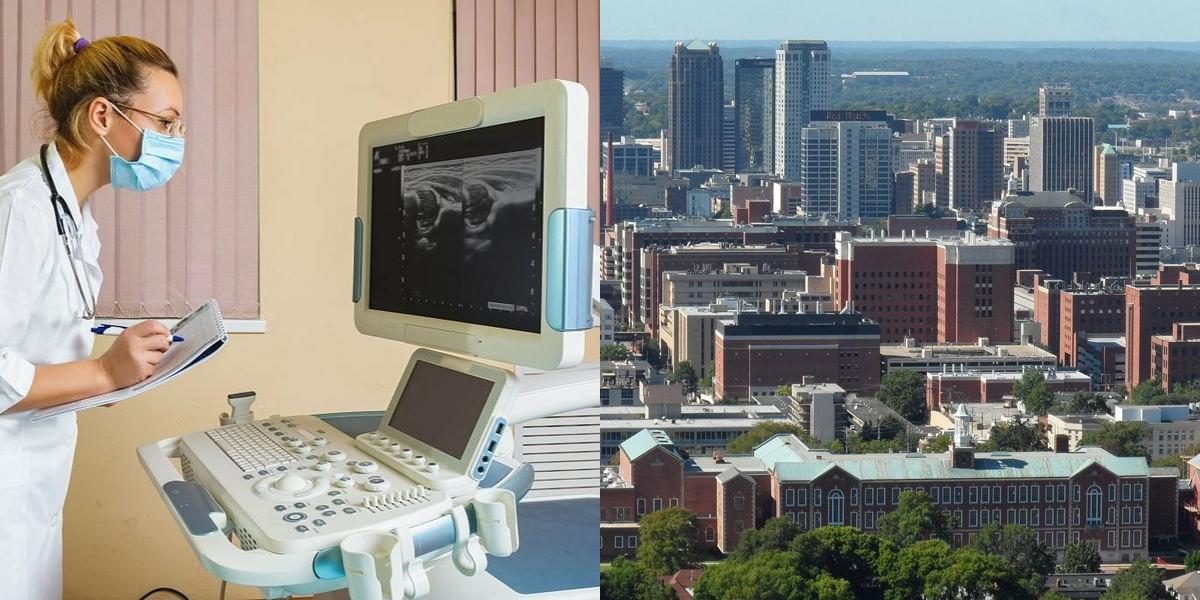How to Become a Medical Sonographer in Alabama (2025)

If you're interested in a stable healthcare career that doesn’t require medical school, becoming a Diagnostic Medical Sonographer in Alabama is a proven path. Sonographers use ultrasound imaging to help doctors diagnose and monitor conditions, from heart disease to high-risk pregnancies. This guide breaks down how to get started, where to study, how long it takes, what it costs, and what you can expect to earn.
As of May 2024, medical sonographers in Alabama earn an average salary of $66,820 per year, with projected national job growth of 11–15% through 2033 (BLS).
Where to Find Diagnostic Medical Sonographer Classes in Alabama?
You can find accredited training programs on Dreambound. It’s the easiest way to compare sonography schools by location, price, and program length.
Recommended:
Diagnostic Medical Sonographer training in Birmingham
Career Paths and Opportunities after Becoming a Diagnostic Medical Sonographer
Earning your initial certification is just the beginning. You can advance your career by specializing or taking on leadership roles.
- Specialized Sonographer: Earn additional ARDMS credentials in areas like Adult Echocardiography (RDCS), Vascular Technology (RVT), Pediatric Sonography, or Musculoskeletal Sonography. Multi-credentialed sonographers are highly sought after and often earn higher salaries.
- Lead Sonographer: Oversee the daily operations of an ultrasound department, manage staff, and ensure quality control.
- Clinical Instructor: Teach and mentor students in a sonography program.
- Applications Specialist: Work for ultrasound equipment manufacturers to train staff on new machines and technology.
- Sales Representative: Sell ultrasound equipment to healthcare facilities.
Frequently Asked Questions
How much does a Medical Sonographer make in Alabama?
According to the Bureau of Labor Statistics (BLS), medical sonographers in Alabama earn an average annual salary of $74,070. The annual salary range for Alabama sonographers is $54,560 to $95,700.
How long does it take to become a sonographer in Alabama?
Most people complete their training in about 2 years. Accelerated programs may be available for those with healthcare experience.
What state pays medical sonographers the most?
California pays the highest, with an average salary of $122,670 (BLS, May 2024).
Do you need a license to be a sonographer in Alabama?
No state license is required, but most employers require ARDMS certification to work as a Diagnostic Medical Sonographer.
How much does ultrasound tech school cost in Alabama?
The cost of a sonography program varies by school and degree type:
- Community Colleges: $5,000–$15,000
- Universities: $10,000–$25,000
- Certificate Programs: $3,000–$12,000
Final Thoughts
A career in Diagnostic Medical Sonography offers strong earning potential, job stability, and numerous specialization opportunities in Alabama’s healthcare industry.
By completing a CAAHEP-accredited program, earning ARDMS certification, and gaining hands-on experience, you’ll be well-prepared for a successful career as a Diagnostic Medical Sonographer.
Ready to take the next step? Find the best sonography programs near you with Dreambound today!
If you're considering a career shift or curious about different professional paths, Dreambound has written many guides to help you in making informed decisions. Here are a few:

Athena is Co-founder and CEO of Dreambound.




